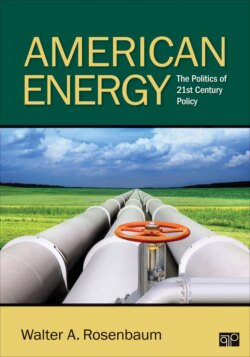Читать книгу American Energy - Walter A. Rosenbaum - Страница 7
На сайте Литреса книга снята с продажи.
Chapter 1 The Politics of Policy
Оглавление“You never want a serious crisis to go to waste,” [Rahm] Emanuel, the incoming White House chief of staff, said at a Wall Street Journal conference last month. “And what I mean by that is an opportunity to do things that you think you could not do before. … What used to be long-term problems, be they in the health care area, energy area, education area—things … that were long-term are now immediate and must be dealt with.”
NPR News, December 23, 2008 1
Shortly before 10:00 p.m. on April 20, 2010, the massive drilling platform straddling the deepest drilling well in the world, a symbol of America’s quest for energy security, exploded in the Gulf of Mexico fifty miles offshore. The fireball hurling thousands of feet into the tropical night unleashed the worst environmental disaster in US history and the second worst oil spill in world history. What followed the explosion of the Deepwater Horizon drilling platform was a human and ecological tragedy rapidly transformed into a signature event in the narrative of American energy regulation.
The Deepwater tragedy unfolded on the threshold of a decade now predicted to transform profoundly the way Americans use energy. Before 2017, it is expected that the United States will
overtake Saudi Arabia and Russia to become the world’s leading oil producer after decades of increasing dependence upon imported oil,
become a net exporter of natural gas while natural gas increasingly displaces coal as the major fuel for producing electricity,
experience a gradual decline in coal production as the electric power industry turns increasingly to natural gas for fuel,
rely on renewable energy as a significant source of electric power,
witness the failed revival of the commercial nuclear power industry, and
enact new regulation to reduce significantly US global climate warming emissions.
The Deepwater explosion itself left a triple legacy. First, the decision to permit the platform and the incompetent regulation that facilitated the disaster were issues of energy governance, and the tragedy intensified an already embittered policy conflict over the future of American offshore energy exploration. Moreover, Deepwater added another disputed matter in the greater national controversy concerning how to govern all the nation’s richly abundant energy resources—a deeply contentious and enduring debate pervading the whole history of American energy development. These matters are the substance of future chapters.
This chapter concerns the remaining legacy. Deepwater also created a political arena. The national media swiftly converged on the unfolding disaster to produce, before a huge national audience, a stage throwing into sharp relief many of the actors, institutions, and events inherent to the nation’s energy policymaking and destined to appear among others throughout the chapters to follow. Deepwater provides a short but practical introduction to this chapter, which concerns the actors, institutions, and setting of American energy policymaking.
